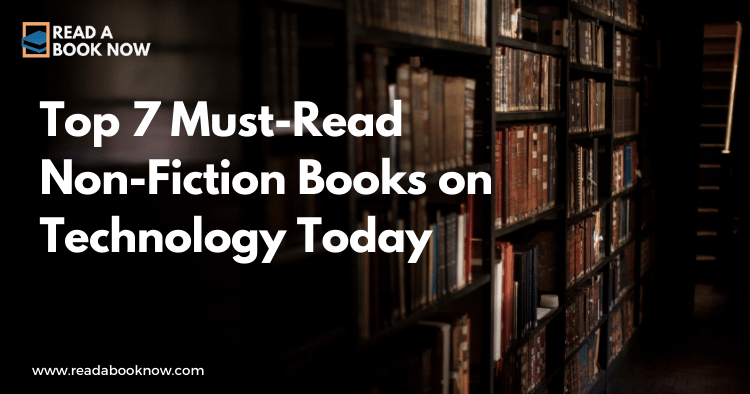- Introduction
- 1. The Innovators: How a Group of Hackers, Geniuses, and Geeks Created the Digital Revolution by Walter Isaacson
- 2. Homo Deus: A Brief History of Tomorrow by Yuval Noah Harari
- 3. The Second Machine Age: Work, Progress, and Prosperity in a Time of Brilliant Technologies by Erik Brynjolfsson and Andrew McAfee
- 4. How to Create a Mind: The Secret of Human Thought Revealed by Ray Kurzweil
- 5. Weapons of Math Destruction: How Big Data Increases Inequality and Threatens Democracy by Cathy O’Neil
- 6. The Code Book: The Science of Secrecy from Ancient Egypt to Quantum Cryptography by Simon Singh
- 7. Life 3.0: Being Human in the Age of Artificial Intelligence by Max Tegmark
- Conclusion
- FAQs
Introduction
In our rapidly evolving world, technology is not just a tool; it’s a pivotal force shaping our lives, societies, and the future. Understanding the nuances of technology is crucial for anyone looking to navigate the complexities of modern life. Whether you’re a tech enthusiast, a professional in the field, or just curious about how technology influences our existence, there are numerous insightful non-fiction books that can enhance your understanding. Here’s a curated list of the top seven must-read non-fiction books on technology today.
1. The Innovators: How a Group of Hackers, Geniuses, and Geeks Created the Digital Revolution by Walter Isaacson

Walter Isaacson, known for his biographies of Steve Jobs and Leonardo da Vinci, takes us on a journey through the history of the digital revolution in The Innovators. This book delves into the collaborative nature of innovation, highlighting contributions from Ada Lovelace to Bill Gates who played significant roles in creating the technologies we rely on today.
“Isaacson’s narrative emphasizes that innovation is rarely the work of a lone genius; rather, it thrives in collaborative environments.”
Isaacson’s narrative offers insights into how teamwork and collaboration fueled technological advancements. The book is not just a history lesson; it’s a reminder that innovation often comes from diverse minds working together. If you’re interested in understanding the roots of today’s technology, this book is a must-read.
Learn more about Walter Isaacson’s work here.
2. Homo Deus: A Brief History of Tomorrow by Yuval Noah Harari

In Homo Deus, Yuval Noah Harari explores the future of humanity as we integrate technology into our lives more deeply. Harari argues that as we solve pressing problems like famine and disease, we will shift our focus toward achieving immortality, happiness, and divinity. The book takes a thought-provoking look at how artificial intelligence and biotechnology might reshape our societies and our very essence as humans.
“Harari’s exploration of the future compels readers to confront the ethical dilemmas that accompany technological advancement.”
Harari’s writing encourages readers to ponder profound questions about the future, making it a perfect choice for those interested in the ethical implications of advancing technology.
Discover more about Yuval Noah Harari’s insights here.
3. The Second Machine Age: Work, Progress, and Prosperity in a Time of Brilliant Technologies by Erik Brynjolfsson and Andrew McAfee

The Second Machine Age by Erik Brynjolfsson and Andrew McAfee examines how digital technology is transforming the economy and labor market. The authors discuss the implications of automation and artificial intelligence, arguing that while these advancements can lead to greater productivity, they also pose significant challenges such as job displacement and income inequality.
“This book provides a balanced view, highlighting both the opportunities and dangers of technological change.”
This book stands out by providing a balanced view of the benefits and pitfalls of rapid technological progress. It’s essential reading for anyone interested in the future of work and how technology influences economic structures.
Check out insights from Brynjolfsson and McAfee’s research here.
4. How to Create a Mind: The Secret of Human Thought Revealed by Ray Kurzweil

Ray Kurzweil, a renowned futurist and inventor, presents his vision of artificial intelligence in How to Create a Mind. Kurzweil delves into the workings of the human brain and proposes that understanding these processes can lead to the creation of machines with human-like intelligence. He discusses concepts like pattern recognition and the role of emotions in decision-making.
“Kurzweil’s insights into the human brain serve as a roadmap for the next generation of AI development.”
For anyone fascinated by AI and the potential to simulate human thought, this book offers a compelling perspective. Kurzweil’s optimistic outlook on technology encourages readers to consider how AI can enhance our lives rather than replace us.
Explore more about Ray Kurzweil’s work and ideas here.
5. Weapons of Math Destruction: How Big Data Increases Inequality and Threatens Democracy by Cathy O’Neil

Cathy O’Neil’s Weapons of Math Destruction brings to light the darker side of big data and algorithms. O’Neil argues that many algorithms used in decision-making processes—ranging from college admissions to insurance—are flawed and can perpetuate inequality and injustice.
“O’Neil’s critical examination of algorithms reminds us that data-driven decisions can have real-world consequences.”
This book is essential for anyone looking to understand how technology can sometimes work against societal progress. O’Neil’s insights prompt readers to question the fairness of the systems that govern our lives, making it a vital read in today’s data-driven world.
Learn more about Cathy O’Neil’s advocacy for ethical data science here.
6. The Code Book: The Science of Secrecy from Ancient Egypt to Quantum Cryptography by Simon Singh

Simon Singh’s The Code Book is a fascinating exploration of the history of cryptography. From ancient codes to modern encryption techniques, Singh narrates how the art of secrecy has evolved alongside technology. This book is not only informative but also engaging, as it weaves stories of espionage and intrigue into the history of codes and ciphers.
“Singh’s narrative captivates the reader, making complex subjects accessible while revealing the importance of secrecy throughout history.”
For those interested in the intersection of technology, history, and security, this book offers a compelling glimpse into how secrecy shapes our world.
Discover more about Simon Singh’s work here.
7. Life 3.0: Being Human in the Age of Artificial Intelligence by Max Tegmark

Max Tegmark’s Life 3.0 explores the profound implications of artificial intelligence on society. Tegmark discusses various scenarios for the future, examining how AI can be aligned with human values to ensure a beneficial coexistence. The book encourages readers to think about the ethical considerations of AI development and its potential impact on humanity.
“Tegmark’s thoughtful analysis on AI challenges us to envision a future where technology and humanity coexist harmoniously.”
If you’re looking to understand how to navigate the future in an AI-driven world, this book is an essential read. Tegmark’s thoughtful analysis makes it accessible and engaging for readers of all backgrounds.
Learn more about Max Tegmark and his work at the Future of Life Institute.
Conclusion
These seven books offer a wealth of knowledge and insights into the multifaceted world of technology. Whether you’re interested in the history, ethics, or future of technology, each of these titles provides a unique perspective that can deepen your understanding. Embrace the opportunity to learn from these thought leaders, and you’ll be better equipped to engage with the technological landscape of today and tomorrow.
FAQs
Q1: Where can I find these books?
A1: You can find




